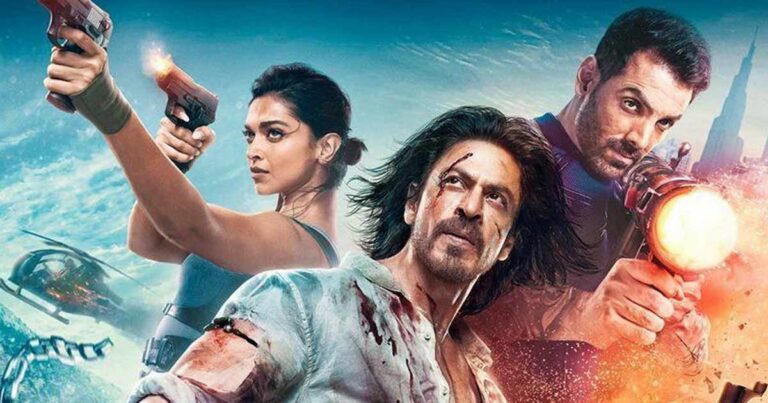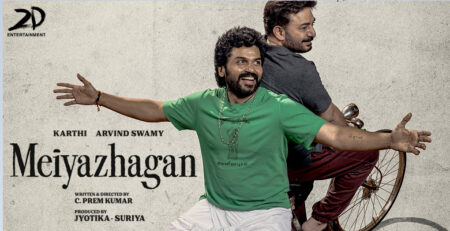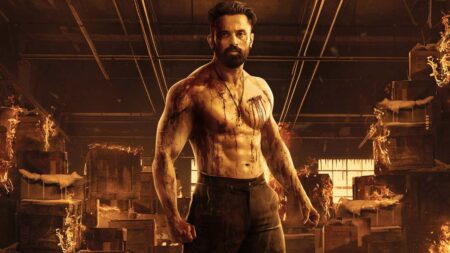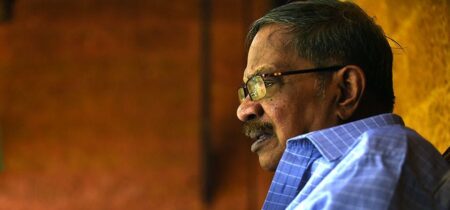Pathaan breaks the stereotype of Islamic Terrorism.
With the two parts of Viswaroopam, Baahubali and KGF, and the latest
blockbusters Ponniyin Selvan, RRR and Kanthara, the South Indian film industry has
been dominating the Indian field of cinema for quite a while. Recently, South Indian films
also brought home two Oscars (Naatu Naatu for the best original song and ‘The
Elephant Whisperers’ for the best documentary short film). Of late, with the OTT
platforms and the movies being available in multiple languages enhancing the reception
of South Indian films and admiration towards them, the past glory of Bollywood further
diminished. However, now Pathaan and its extraordinary success in the box office is
reinstating the Bollywood cult. In the opening sequence of the movie, when Pathaan
(Shah Rukh Khan) makes an intriguing (perhaps sarcastic) request-“Hindi Only Please”-
to his rivals, it reiterates this discourse.
Even before it made to the theatres, Pathaan was discussed, debated and witnessed
hate campaigns. In fact, it was no longer a film and its cinematic existence gave way to
certain rhetoric seldom familiar to the public. With its smashing action sequences
Pathaan reminds the audience to cancel the logical thinking and critical reasoning to
ensure enjoyment.
For the fans of Shah Rukh Khan, it is a feast. But for a critical mind, it is a treasure mine
and the discourse that emerges is rich with metaphors, analogies and allegories.
What is there in a name?
The title of the movie and the titular character played by Shah Rukh Khan proved to be a
scathing attack on the hate philosophy broadcasted ever since the release of the song
that initiated certain controversies. A RAW agent assuming the name Pathaan is
interesting. The name signifies bravery and kindness. When it is attributed to a spy who
usually conceals his identity and assumes various names (as seen in popular espionage
movies), Pathaan is portrayed as someone who deliberately plays with his identity. We
have seen how this ‘play’ worked in Viswaroopam.
When Rubai (Deepika Padukone) asks him if he is a Muslim, he replies that he was an
orphan found in a cinema hall. This reveals Shah Rukh Khan’s identity or the identity
that he wants others to attribute to him. Shah Rukh as the film persona is born and
brought up in the cinema halls. Or the whole world is a cinema hall for him. It is certainly
a response to the heated debates about his religious identity and allegations about lack
of faithfulness to India. Pathaan’s valour, blood and tears are shed for his country and
Pathaan becomes a metaphor for Shah Rukh Khan. When he says on screen “Zinda
hein”, it declares that despite all attacks and vehement criticism, he is alive and his
silence never meant a metaphorical death.
When Rubai sarcastically greets him with “salāmu ʿalaykum”, the quick witted Pathaan
reciprocates with “waʿalaykum aslam wa-raḥmatu llāhi wa-barakātuhu (Peace be upon
you as well as God’s mercy and blessings). Is it not him wishing his detractors peace
and harmony?
It is articulated in the film that Pathaan’s name annoys people and this directly implies
the hate discourse that was propagated against Shah Rukh Khan based on his Muslim
identity. Pathaan’s enemy Jim (John Abraham) states that Pathaan is “the son of India”
and this clears all apprehensions about whether “he is on our side or not”, endorsing his
loyalty to the country.
Deconstructing the binaries
Pathaan resumes the trend of disconnecting the discourses that picturise Pakistan as
evil. The movie treats the Indo-Pak binary with more tolerance. The Pakistani General
who plans a bio-war on India is portrayed as a cancer patient who has got very few
years to live. When the unethical war politics is foregrounded, at the background one
can read the determination and ‘patriotism’ that the Pakistani officer has. The ISI agent
when is called a traitor states clearly that her country will realise its mistakes once and
asserts that she cannot wage a bio-war. The brave and kind Pathaan pursues the war
on terrorism without sacrificing his humaneness (something that he perhaps expects
from the society). Pathaan saving the people from the Afghan Madrassa is an example.
Breaking this stereotype of Islamic Terrorism is briefly pictured in another recent release
titled Sita Ramam. Pathaan too does not link a religion with terrorism.
Endorsing the Article 370
When the movie refers to several propagandas and agendas shot against the
actor/person Shah Rukh Khan, it does not challenge or upset the extreme right wing.
There is a clear ratification given to the Article 370. Patriotism is underlined throughout.
The chief of RAW Nandini Garewal (Dimple Kapadia) epitomises patriotism when she
decides to die to save the country from a biological disaster. Before pulling the trigger of
the gun, she says “Om Nama Shivaya” indicating the spiritual/religious orientation of the
chief with supreme scientific temperament. Again, there is a distinction showcased
between being a professional and having varying personal/religious/political orientation.
The policy is one of tolerance. Of course, the director Siddarth Anand is extremely
careful in handling the current affairs and weaving them in the film’s narrative when he
nourished the plot with abundant references and allegories to the filmic and political
discourses around Shah Rukh Khan.
A final statement to the detractors
The hilarious sequences of dialogues exchanged between the two Khans in this film are
its highlights. There are plenty of witty references to the previous spy-series of Yash Raj
Films. Winding up the discourses on the significance of the phenomenal actor, asserting
his nickname as King Khan, the final dialogues between the Khans assert that in the
years to come they must do the work as there is nobody else who could replace them!
The movie thus concludes by confirming the irreplaceability of the phenomenon called
Pathaan alias Shah Rukh Khan.




